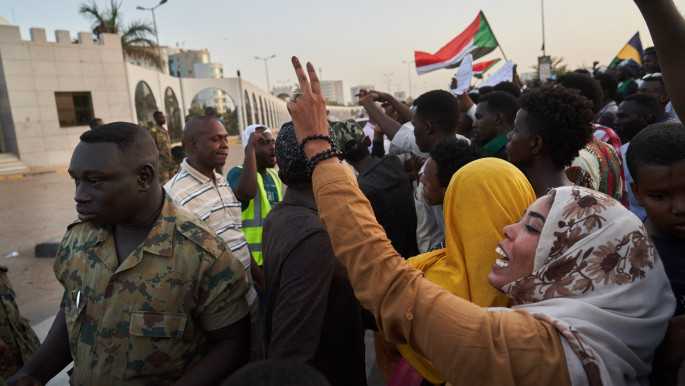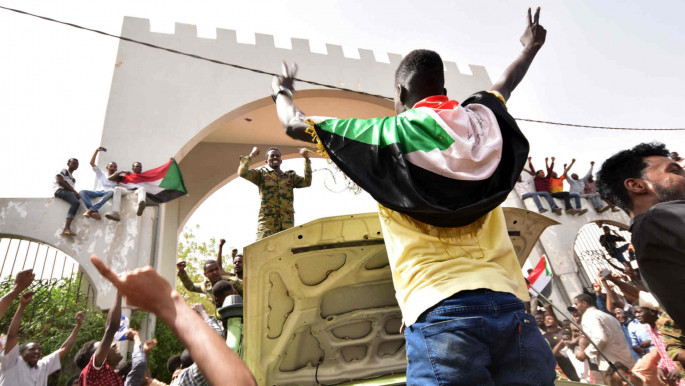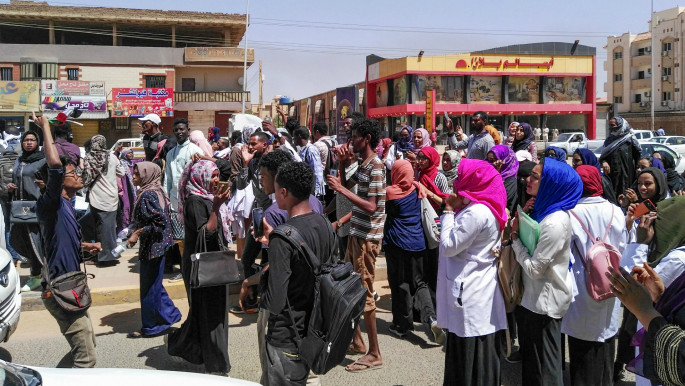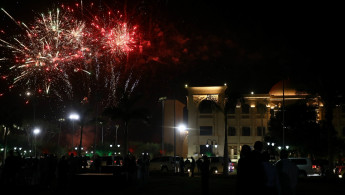Sudan's year long march to democracy and reform
Sudan's year long march to democracy and reform
The year 2019 will undoubtedly forever be engraved in the hearts and minds of the people of Sudan who celebrated the start of the New Year without Bashir.
7 min read
Sudanese people watched fireworks at the presidential palace with their new transitional government [Getty]
Sudan, the north-eastern country, formerly known as Africa's largest country has historically witnessed three peaceful peaceful revolutions that brought about regime change, the first being in October 1694, the second in April 1985 and the last one being the one that broke out in late December in 2018.
The latter brought about Sudan's current transitional government under a power sharing deal between the military and the civilians.
The latter brought about Sudan's current transitional government under a power sharing deal between the military and the civilians.
The year 2019 will undoubtedly forever be engraved in the hearts and minds of the people of Sudan. It was a year of learning and unlearning; a year of learning how to fight for what they stand for and a year of unlearning all the lessons taught by the previous regime.
It is only appropriate to say that the people of Sudan are self-taught.
It is only appropriate to say that the people of Sudan are self-taught.
The majority of the protesters, both women and men, were below the age of 25 which means that most of them were born during Omar al-Bashir's rule. Yet it was these very young people who decided to go out against an authoritarian rule and peacefully march against a dictator determined to crush a peaceful movement with a fist of violence.
The atrocities the people of Sudan witnessed during this year are unspeakable; leaving hundreds killed, thousands injured and a nation that's still healing from the trauma.
 |
|
| Read also: Sudan uprising: Echoing the voices of the youth |
The Sudan Uprising which many tried to label as an extension of the Arab Spring, proved itself to be, as the people of Sudan call it, The African Sandstorm. One that has extended far beyond the parameters of Africa inspiring other nations and teaching the world a lesson in peaceful revolting.
Sudan has come a long way and its transitional government has taken very promising steps towards change and reform, but it still has a long way to fulfil the demands of the revolution and implement the slogans of the Uprising. Peace and Justice being the most urgent and pressing of the three.
 |
What I'm really concerned about is peace, because no matter how hard we try to deny it, there is a red flag on this issue |  |
"What I'm really concerned about is peace, because no matter how hard we try to deny it, there is a red flag on this issue. We thought it was finally done and then El Obeid happened, they signed and everything but then Port Sudan incidents happened and now El Gineina. It's like we are doomed to live at war," said Hiba Elameen a dentist who worked on relaying information through social media accounts during the protests.
Even though many are sceptical about the joint rule between the civilians and the military, it is important to note that some progress has been made over the last four months.
"As the transitional period has gone on, I've become more convinced of this partnership's ability to last a long time," said Hatim Eujayl.
Under the transitional government Sudan has witnessed the dissolution of the National Congress Party [NCP], abolishment of the public order law, allowing cross-border and cross-line humanitarian access to conflict areas such as Kauda and Yabus.
Sudan was also moved to the Special Watch List, which is a very promising step towards removing Sudan from the list of state sponsors of terrorism. Prime Minister, Dr Abdalla Hamdok, was elected as the head of the Intergovernmental Authority on Development [IGAD] which in return shows international recognition of the change happening in the country.
Sudan has also recommitted itself to many conventions like the Convention of the Rights of the Child. One of the key incidents which took place, recently, is the sentencing of 29 men to death for the killing of pro-democracy school teacher Ahmed Elkheir.
Under the transitional government Sudan has witnessed the dissolution of the National Congress Party [NCP], abolishment of the public order law, allowing cross-border and cross-line humanitarian access to conflict areas such as Kauda and Yabus.
 |
|
| Read also: 'A portal into tomorrow's Sudan': Inside the sit-in that brought down Sudan's dictator Bashir |
Sudan has also recommitted itself to many conventions like the Convention of the Rights of the Child. One of the key incidents which took place, recently, is the sentencing of 29 men to death for the killing of pro-democracy school teacher Ahmed Elkheir.
Despite all the positive steps taken one thing that is quite evident is that the country is also still grappling with the transition, which some consider to be slow, from three decades of authoritarian rule.
Some changes made by Sudan's transitional government, like the abolishment of the Public Order Law and the officiating of Sudan's first female football team, were faced with push back from ultraconservatives. This only goes to show that toppling Bashir was only the beginning; the tip of the Kezan iceberg.
Some changes made by Sudan's transitional government, like the abolishment of the Public Order Law and the officiating of Sudan's first female football team, were faced with push back from ultraconservatives. This only goes to show that toppling Bashir was only the beginning; the tip of the Kezan iceberg.
 |
One cannot realistically expect a regime that has embedded itself in every aspect of Sudan to go away by the removal of the symbolic figures |  |
"One cannot realistically expect a regime that has embedded itself in every aspect of Sudan to go away by the removal of the symbolic figures. The surrogates and oligarchs who could face justice and financial ruin will do everything to protect themselves. This, in turn, will frustrate the public and may lead to division among the people to the advantage of the old regime," said Sudanese-American Councilman Mohamed Seifeldein.
"I hope for a peaceful resolution to all these issues. Of course, how the economy fairs will be a strong factor."
"I hope for a peaceful resolution to all these issues. Of course, how the economy fairs will be a strong factor."
Atrocities are still being committed and innocents are still caught in the cross fires.
"As usual, the situation looks stable if you're just looking at central Sudan. Look at the peripheries, with the tribal clashes in the East and West and the economic situation that's even worse than that of Khartoum. I try not to be alarmist, but I think it's clear that the transitional government has a lot of work to do as far as creating a truly sustainable and productive system for all areas of Sudan," added Hatim.
Justice seems to be the number one priority of the people of Sudan, and even though Sudan has taken some of its first steps towards justice and restoring people's faith and trust in its judiciary some don't seem to be very pleased or even convinced.
"The transitional government has not only taken insufficient steps towards justice, especially for the martyrs of the thirty-year dictatorship, I doubt that they will even take any steps soon. They have chosen realpolitik over the demands of the streets, and that is because of the nature of their agreement with the military. Some are arguing that this is temporary, but I fear this not to be the case," said Mohammed Elnaiem.
 |
|
| Read also: Sudanese women detained and sexually harassed while protesting for change |
Sudan, the land many of its people deemed forever lost to the NCP this year opened its doors wide open to welcome the thousands of Sudanese people who have been in exile.
"Shunned away from their country by Bashir's regime, I believe that the dissolution of the NCP is probably the biggest revolutionary step taken, and the end of the laws policing women publicly is another. More importantly, Sudan has undergone a cultural revolution, and Sudanese workers have relearned the power of the general strike and civil disobedience," Elnaiem added.
"Shunned away from their country by Bashir's regime, I believe that the dissolution of the NCP is probably the biggest revolutionary step taken, and the end of the laws policing women publicly is another. More importantly, Sudan has undergone a cultural revolution, and Sudanese workers have relearned the power of the general strike and civil disobedience," Elnaiem added.
A cloud of scepticism, optimism and anticipation is hovering over Sudan. The people of Sudan, who bore the brunt of the actions of the previous regime and paid a hefty price to topple Bashir's regime are waiting, refusing to put down their flags or lower their voices.
The streets of Sudan still see the sight of masses of protesters marching and chanting peacefully, each time for a different reason. Prepared to fight for their revolution, the youth of Sudan are more than ready to march out again.
The streets of Sudan still see the sight of masses of protesters marching and chanting peacefully, each time for a different reason. Prepared to fight for their revolution, the youth of Sudan are more than ready to march out again.
"I really like the change in the general attitude, people have more positive outlook and they are, to some extent, supporting the government. This should be enhanced by raising the public awareness both socially and environmentally," said Hiba Elameen.
 |
Sadly the environment the old regime left behind has torn some of what Sudanese people are known for, but their resiliency has been on display this past year. The culture will continue to thrive in many forms and will only get better |  |
Councilman Seifeldein added, "Sadly the environment the old regime left behind has torn some of what Sudanese people are known for, but their resiliency has been on display this past year. The culture will continue to thrive in many forms and will only get better."
Sudan holds great potential to become a success story, one written in history books. But the situation remains highly unpredictable. Whether or not Sudan will be able to achieve successful and sustainable democratising outcomes, is a question only time can answer.
Afnan Hassab Jaffar is a 22-year-old surgeon-in-the-making and blogger based in Sudan who is a dedicated humanitarian, social activist and unwavering feminist. She is interested in African and women studies.
Follow her on Twitter: @errfnern



